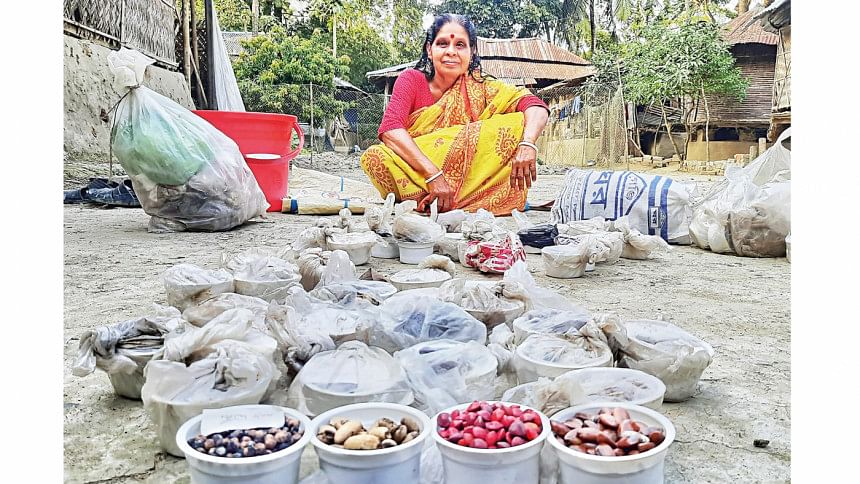Karuna, a pioneer in seed preservation

Sitting in her narrow yard, Karuna Mandal was sorting watermelon seeds. Nearly a hundred plastic and earthen pots, wrapped in polyethene and full of different kinds of seeds, lay in front of her.
"Today, it is a sunny day, so I am drying seeds and checking them out," she said. "Here, I have a total of 97 varieties of seeds, mostly those of fruits and vegetables."
This is the local khudejaam, meaning small berries, and that is custard apple and then pumpkin, bottle gourd, lady finger, brinjal, radish, spinach, she goes on.
Also, there are seeds of paddy like Balam, Rani Salut, Banshful and other grains, she said showing different pots.
Karuna is from the coastal village of Sukdara, a partially saline area by the Khulna-Naliyanroad, three and a half kilometres away from Katianangla bus stand, under Batiaghata Upazila in Khulna.
By preserving local varieties of seeds and doing organic farming, Karuna, a 52-year-old farmer, has become a role model to other women in the area. She grows vegetables without using chemical fertilisers and insecticides. Seeing Karuna, other women in the area also started organic farming.
Asked how she started, Karuna said, she has been preserving seeds for nearly 25 years. Since her marriage with Provash Mandal, Karuna began the practice as part of the tradition of farmers' families.
But later, she started in a more organised way in 2010, when she got an exposure tour to Rameharpur Union Parishad of Netrokona district by LoCOS, a non-government organisation, about the use of natural fertiliser and participation of women in cultivation.
Upon returning to her native village, she shared her knowledge with her husband and neighbours and actively participated in cultivation using local varieties.
"It is very important to preserve local varieties of seeds as, in our saline-prone area other seeds do not grow well. I use these seeds for my cultivation and also distribute it to other farmers who need it," she said.
Asked why she takes the hassle of preserving seeds as she could buy them from the market, Karuna replies, "It is cheaper and more adaptable to the climate, while also producing higher yields than the hybrid seeds available in the market."
"Sometimes farmers are cheated by buying substandard seeds available in the market that is why I do not need to buy seeds from the market," she added.
There are at least 20 women in her village who have been preserving seeds and practicing organic farming, Karuna said. A local NGO organises a seed fair every year. Women from different villages participate in this fair.
"In the fair, we get to know who has which variety, and we exchange our seeds. We also exchange our views on how to grow certain varieties of crops," said Karuna.
Other women, like Chanda Sarkar and Shamoli Sarker from the same village, were inspired by Karuna. They are also cultivating local varieties of vegetables and preserving seeds.
"Many local people come to my house daily to buy fresh vegetables," said Shamoli Sarker, 43.
Preserving 78 types of local-borne seeds and sowing it in her crop land, Shamoli became self-reliant by selling seeds and vegetables. She is also making vermicompost at her house and selling it.
"I received an order for 300 kilogram vermicompost from a local shopkeeper, at 22 taka per kilogram," she said.
Robiul Islam, upazila DAE officer of Batiaghata, told The Daily Star that preserving seeds helps people to do organic farming and to have a sound livelihood.
"Preserving seeds is a tradition of the people of this locality. Besides, it has an economical value," he said, adding that they are preserving over 100 varieties of vegetables and paddy seeds that are dying out.
It is proven that the local variety of seeds needs less fertilisers and insecticides, said Robiul Islam.
"I will patronise the seed preservation if they need my help," said the DAE officer.
Delowar Jahan, a practitioner and organiser of "natural agriculture"--which avoids using any chemical fertiliser and pesticide---has been promoting local seeds for over a decade.
He said, the adaptation capacity of local seeds is much more than other seeds.
"When a local variety grows in a particular area for a few years, genetically it becomes tolerant to local climatic conditions. So, preserving seeds of local varieties should be the best practice for the saline-prone coastal areas," added Delowar.
Some farmers' families have been preserving seeds for generations.
"Seeds of local varieties, preserved in a family for generations, have the most adaptive capability for the particular climatic conditions of that area," Delowar said. He suggested that the agricultural department should research more on local varieties to fight climate change in the agricultural sector.


 For all latest news, follow The Daily Star's Google News channel.
For all latest news, follow The Daily Star's Google News channel. 



Comments